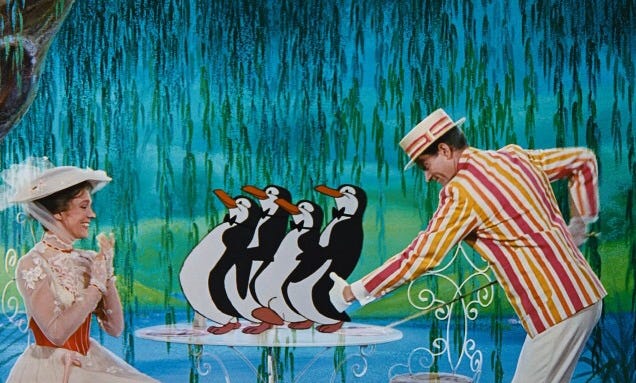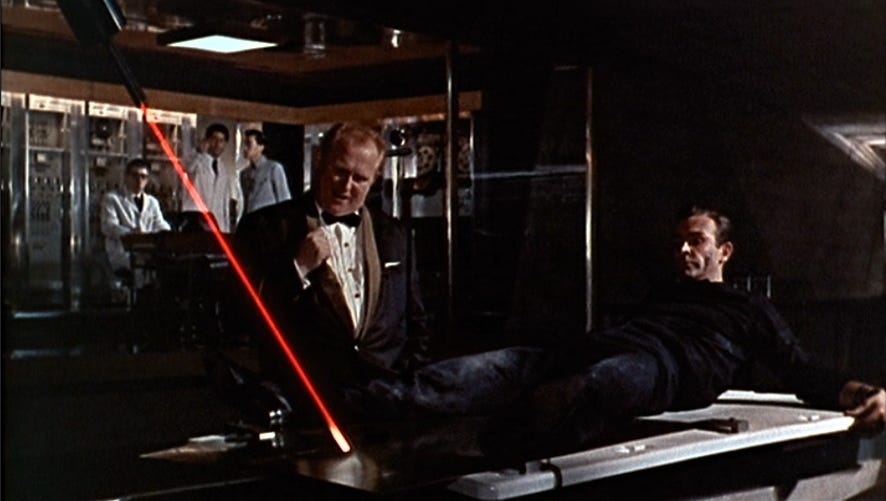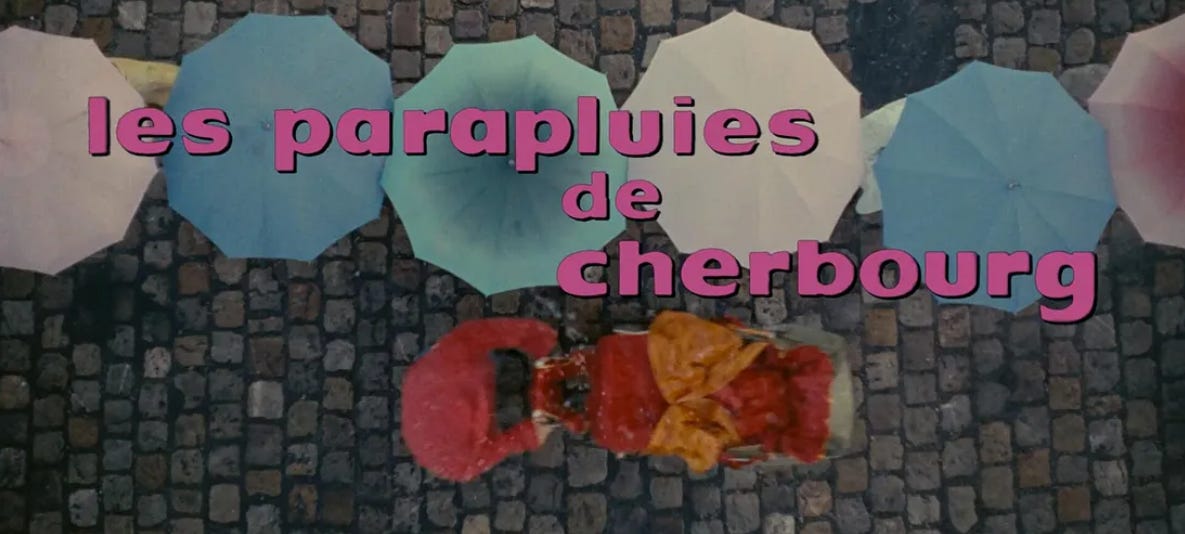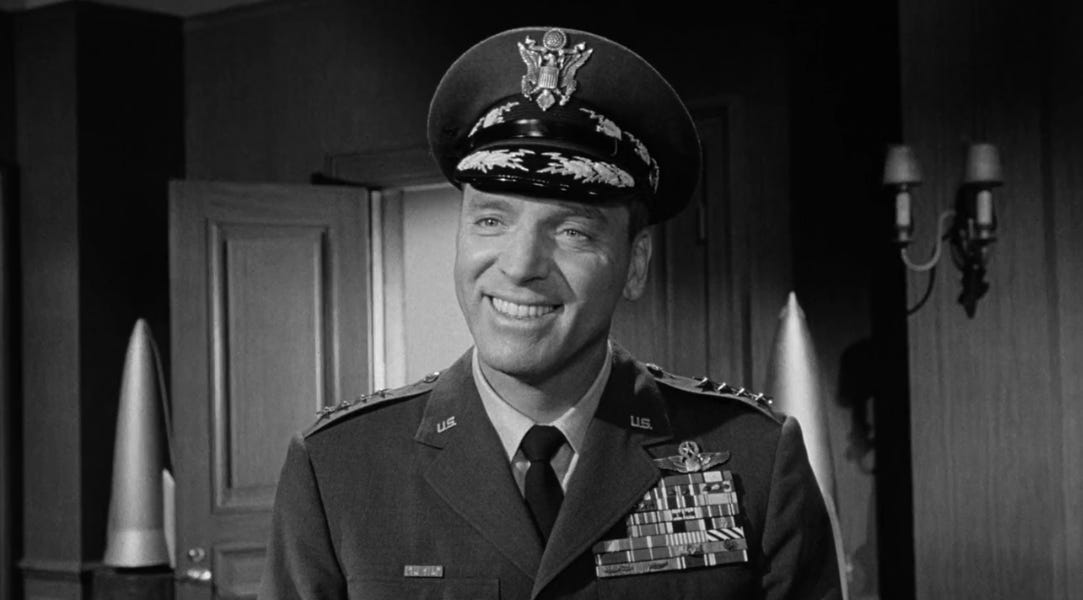What We Missed: 1964
A supercalifragimehsticmehxpialimehcious year.
ICYMI: the four films nominated for Best Actor Oscars in 1964 were My Fair Lady, Zorba the Greek, Becket, and Dr. Strangelove or: How I Learned to Stop Worrying and Love the Bomb. The links provide the trivia write-ups on those films while this post discusses what else was happening in the movies that year.
1964 Best Picture winner: My Fair Lady. All four of the movies we watched were nominated for Best Picture. What was the only Best Picture nominee we missed? That’d be the (mostly) live-action Disney musical Mary Poppins.
Mary Poppins was based on a book series by P. L. Travers and starred Julie Andrews as the titular umbrella-toting nanny. The film co-starred Dick Van Dyke as Mary’s friend Bert and David Tomlinson as Mr. Banks, her employer. It features songs from the Sherman Brothers; below are some of those songs most of those songs.
“Sister Suffragette” (the children need a nanny because Mrs. Banks is busy suffragetting)
“The Perfect Nanny” (the kids lay out the required qualifications for a nanny)
“A Spoonful of Sugar” (“helps the medicine go down in a most delightful way”)
“Supercalifragilisticexpialidocious”
“I Love to Laugh” (Uncle Albert levitates when he laughs)
“Feed the Birds (Tuppence a Bag)” (The Bird Woman sells feed outside of St. Paul’s)
“Chim Chim Cher-Ee” (“A sweep is as lucky, as lucky can be”; won Best Original Song Oscar)
“Let’s Go Fly A Kite” (where Mr. Banks finally stops being the no-nonsense father and connects with his children).
Because the film combined live-action and cartoons, it also won the Best Visual Effects Oscar.
The film was adapted into a stage musical by Julian Fellowes that opened on Broadway in 2006. The 2013 film Saving Mr. Banks, which fictionalized the creation of the movie, had Emma Thompson playing P.L. Travers and Tom Hanks as Walt Disney. The Poppins Cinematic Universe expanded with sequel Mary Poppins Returns (2018), where Emily Blunt took up the title role.
Highest grossing film: The top two were Mary Poppins and My Fair Lady. #3 was Goldfinger, the third James Bond movie in the series. Bond (Sean Connery) battles Auric Goldfinger (Gert Fröbe), who plans to irradiate the gold supply at Fort Knox. He also fights Goldfinger’s henchman Oddjob (Harold Sakata) and seduces Pussy Galore (Honor Blackman).
Best Actress Oscar race: Recall that Julie Andrews originated the role of Eliza Doolittle on stage in “My Fair Lady,” but that she was replaced by Audrey Hepburn in the film. Andrews, crushed, settled for the lead in Mary Poppins instead—and with the narrative of a casting snub at her back, won the Best Actress Oscar. Meanwhile, Hepburn wasn’t even nominated for her turn as Doolittle. So yeah, awards are stupid. Anyway, here are the other nominations from 1964:
Anne Bancroft for The Pumpkin Eater. Bancroft’s character gets cheated on but learns to deal with it.
Sophia Loren for Marriage Italian Style. This one is unrelated to Divorce Italian Style, though it does star Marcello Mastroianni.
Debbie Reynolds for The Unsinkable Molly Brown. Based on a true story: Molly Brown marries rich, gets philanthropic, and survives the sinking of the Titanic.
Kim Stanley for Séance on a Wet Afternoon. A medium kidnaps a child so she can “use her abilities” to rescue the child.
Relitigating the Best Actor race: Great performances from all five guys. My rankings would be O’Toole-Harrison-Quinn-Burton-Sellers, but there are no wrong answers this year.
Quick Hits
The Umbrellas of Cherbourg: It’s a film where all the dialogue is sung, like an opera. It was the breakout film for Catherine Deneuve and won the Palme d’Or for director Jacques Demy. Unfortunately, its plot sounds just like Fanny, so I’m pretty sure it’s bad.
A young Michael Caine starred with Stanley Baker in Zulu, about a battle in the 1879 Anglo-Zulu War where 150 British soldiers held off 4,000 Zulu warriors. You may ask yourself: isn’t that just colonialist 300 (2006)? Probably, yeah.
Seven Days in May: Burt Lancaster plays a general out to overthrow the president, played by Fredric March, and Kirk Douglas has gotta stop him.
Hush…Hush, Sweet Charlotte. This one is the spiritual successor to What Ever Happened to Baby Jane? (1962), in that it had the same director, was adapted from the same author’s work, and was supposed to star the same leads (Joan Crawford and Bette Davis). But when Crawford dropped out, she was replaced with Olivia de Havilland.
Quicker hits: The Night of the Iguana, a Tennessee Williams adaptation…Sam Fuller’s neo-noir The Naked Kiss…Father Goose…Hitchcock’s Marnie…Pink Panther movie #2, A Shot in the Dark, and Beach Party movie #2, Muscle Beach Party…Jane Fonda’s Joy House…Fred MacMurray becomes the First Gentleman (WHAT A CONCEPT) in Kisses for My President…Sergio Leone’s A Fistful of Dollars…Elvis’ Viva Las Vegas, the Beatles’ A Hard Day’s Night, and the Rat Pack’s Robin and the 7 Hoods…Red Desert, from Italian Michelangelo Antonioni…The Carpetbaggers, based on a Harold Robbins novel…Japanese new-wave film Woman in the Dunes, for which Hiroshi Teshigahara was nominated for Best Director…Topkapi, about stealing a dagger from Topkapi Palace.
Trivia Questions
The quiz below serves as a refresher for some of the material covered in the four posts on 1964 films. The answers can be found in the footnotes.
Audrey Hepburn was nominated for the Best Actress Oscar five times. Her final nod was for this 1967 movie, where she played a blind woman.1
Lerner & Loewe based their musical “Camelot” on this work by T. H. White.2
This comedy of manners from G. B. Shaw has a third act called “Don Juan in Hell” that is often performed separately.3
In another Shaw play, this title character removes a thorn from the paw of a lion.4
My Fair Lady is based on “Pygmalion.” In that story, Pygmalion falls in love with a sculpture with THIS name.5
This Greek author wrote “Zorba the Greek” and “The Last Temptation of Christ.”6
This city is the capital of Crete.7
Name the writing systems of both the Minoans and the Mycenaean (two answers expected).8
In Greek mythology, this daughter of King Minos gives Theseus a ball of thread to use to not get lost in the labyrinth.9
The death of this Anglo-Saxon king in 1066 led to the contest for the English throne between Harold Godwinson, Harald Hardrada, and William the Bastard.10
(A “Jeopardy!” daily double) One of the oldest records at the National Archives in London is this record of William the Conqueror’s 1086 survey of England.11
Eleanor of Aquitaine was married to these two kings (two answers expected).12
This actor stars in the Kubrick films Paths of Glory and Spartacus.13
2001: A Space Odyssey’s screenplay was co-written by this sci-fi legend.14
Richard Strauss composed this tone poem whose initial fanfare is used at the beginning of 2001: A Space Odyssey.15
This character is the protagonist of A Clockwork Orange.16
To 1965 we go!
Wait Until Dark.
“The Once and Future King” (which itself was based on “Le Morte d’Arthur” by Thomas Malory).
“Man and Superman.”
Androcles (from “Androcles and the Lion”).
Galatea.
Nikos Kazantzakis.
Heraklion.
Linear A and Linear B.
Ariadne.
Edward the Confessor.
The Domesday Book.
King Louis VII (of France) and King Henry II (of England).
Kirk Douglas.
Arthur C. Clarke.
“Also sprach Zarathustra.”
Alex (DeLarge).





Fact police here again: I'm pretty sure "Night of the Iguana" did get an acting nomination, for Best Supporting Actress.
(Unrelated, my favorite movie of 1964 -- and my second-favorite movie of all time -- is "Fail-Safe," which, yes, has roughly the same plot as "Dr. Strangelove," but takes it in a quite different direction.)